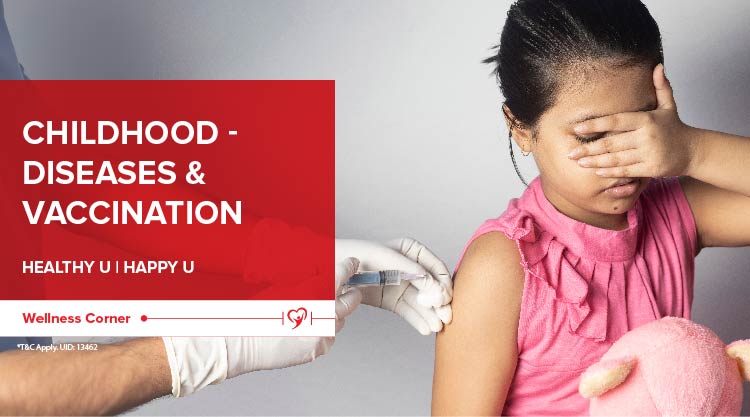

Childhood Vaccines: Shield Against Diseases
Vaccines have revolutionised the world of healthcare by saving countless lives and protecting us from dangerous diseases. Vaccines are crucial for both kids and adults as they protect individuals from potentially life-threatening diseases by stimulating the immune system to recognise and fight specific pathogens. By preventing diseases, vaccinations help individuals maintain optimal health and well-being. They help stop the spread of diseases in communities. Let's understand the role of different types of vaccines, shed light on the importance of immunisation for children, and discuss why it matters.
Types of vaccines
The different types of vaccines are:
1. Live-attenuated vaccines:
In this type, a live but weakened version of the germ/virus that causes a disease is injected into the body. These vaccines create immunity against virus and trigger an immune response similar to the natural infection. Just 1 or 2 doses of most live vaccines can give you a lifetime of protection as they create a strong and long-lasting immune response against the germ & disease it causes. Live vaccines are used to protect against chickenpox, yellow fever, smallpox, and rotavirus.
2. Inactivated vaccines:
In this type, a killed version of the bacteria or virus that causes a disease is injected into the body. These vaccines do not trigger an immune response as strong as the live vaccines hence you may need several doses over time to get on-going immunity against diseases. This vaccine are used to protect against Hepatitis A, flu & polio (shot only), and rabies.
3. Subunit vaccines:
In this, only a specific part of the germ is injected into the body. Because it uses only specific pieces of the germ, they trigger a very strong immune response. These vaccines are also suitable for those with weakened immunity and chronic health conditions. However, to get on-going protection against the disease, you may need to get booster shots.
4. Toxoid vaccines:
Some vaccines are made with inactivated versions of the toxins released by the bacteria/virus. They are called 'toxoids' because while they look like toxins, they are not poisonous and they create a strong immune response.
5. mRNA vaccines:
These vaccines make proteins in order to trigger an immune response. This technology was used to make some of the COVID-19 vaccines.
6. Viral vector vaccines:
These vaccines modify another virus and utilise it as a vector to provide protection from the intended virus. Several different viruses have been used as vectors, including influenza, measles virus, and adenovirus.
What Vaccines Do Kids Need?
Children up to the age of 16 should be given childhood vaccinations for protection against preventable diseases. This includes:
1. BCG
The Bacille Calmette-Guérin (BCG) vaccine is one of the most widely used vaccines and is given to protect children from meningitis and tuberculosis (TB).
Side-effects
High fever, headache, and soreness at the injection site are mild reactions. Rare, serious complications include bone inflammation and abscesses.
2. Hepatitis B
This potentially critical disease is caused by the HBV or hepatitis B virus. In this disease, the virus affects the liver causing liver cancer, liver cirrhosis, liver failure and even death. The Hepatitis B vaccine helps protect children against this life-threatening liver infection. The first dose is given within 24 hours of birth, followed by the 2nd dose at 1-2 months of age, and the 3rd dose between 6-18 months. However, if the mother has Hepatitis B, the child should get the first shot of the vaccine within 12 hours of birth.
To Know More About Hepatitis, Read - Everything You Need To Know About Hepatitis
Side-effects:
Mild reactions such as pain/swelling/redness at the injection site and fever which go away on their own.
3. Oral Polio Vaccine (OPV)
Polio, also called Poliomyelitis, is a life-threatening and infectious disease which can affect the brain and spinal cord, leading to paralysis. It is caused by poliovirus, and children below age of 5 are the most vulnerable. OPV helps prevent Poliomyelitis.
Side-effects
Some common side-effects which are mild and eventually go away are low-grade fever, redness/pain/swelling at the injection site, fatigue, irritability, decreased appetite, etc. The severe and rare side effects include swelling of lymph nodes, low blood pressure, convulsion, pricking or tingling sensation, difficulty breathing, wheezing, etc.
4. Pentavalent
With this vaccines, kids get protection from 5 life-threatening diseases, viz., Tetanus, Diphtheria, Hepatitis B, Pertussis, and Hib.
Side-effects
Redness/swelling/pain at the injection site and fever which may last 1-3 days.
5. Rotavirus
Rotavirus infection can cause severe diarrhoea, fever, vomiting, and abdominal pain in infants and children. In severe cases, it can also be fatal. The Rotavirus vaccine is recommended to get protection from this infection and the first dose is administered when the baby is 2 months of age.
Side-effects
Usually, mild side-effects can be seen, which includes vomiting, diarrhoea, and irritability. In rare cases, the child may suffer from intussusception, a type of bowel blockage that needs to be treated in a hospital.
6. Measles, mumps, and rubella (MMR)
The child should be given 2 doses of MMR for protection from three infectious and serious diseases - measles, mumps, and rubella. The first dose is given between 12 months - 15 months of age, and the second at 4-6 years. There should be a gap of at least 4 weeks between the doses.
Side-effects
Common side-effects include fever, mild rash, pain and stiffness in the joints, which may be for a temporary period, and sore arm.
7. DTaP (Diphtheria, Tetanus, and Pertussis)
To help prevent three infectious diseases, viz., diphtheria, pertussis (whooping cough), and tetanus, the primary dose is given as part of pentavalent vaccine followed by two booster doses that are given at 16 -24 months and 5-6 years, respectively.
Side-effects
Mild side-effects include fever, fatigue, loss of appetite, irritability, and swelling/pain at the injection site. In rare cases, severe reactions can occur, which include high fever, seizures, swelling of the entire arm or leg, and non-stop crying for more than 3 hours.
8. Pneumococcal conjugate vaccines (PCV)
The administration of PCV helps protect children against Pneumococcal diseases. Pneumococcal disease is a bacterial infection causing pneumonia, meningitis, and sepsis (blood infection), which can be life-threatening. PCV comes in 3 doses at 6 weeks, 14 weeks, and 9 months (booster dose).
Side-effects
Usually, side-effects are mild, including loss of appetite, fatigue, fever, fussiness, headache, joint pain, and redness/swelling/soreness at the injection site.
9. Japanese encephalitis virus (JEV)
JEV vaccine helps prevent viral encephalitis and is recommended in regions where JE is a public health issue.
Side-effects
Pain/tenderness/swelling at the injection site, fever, headache or muscle aches, which are usually mild.
10. Haemophilus influenzae type b (Hib)
Hib can cause lifelong disability and even death. Hib vaccine is recommended for children below 5 years as they are more at risk of contracting this disease.
Side-effects
Mild reactions from the vaccine include fever, pain/swelling/redness at the injection site and these usually go away after 2-3 days.
11. Varicella
Chickenpox or Varicella vaccine is recommended for protection against chickenpox. Caused by varicella-zoster virus, chickenpox causes itchy, blister-like rashes all over the body, along with fever. It is highly contagious.
Side-effects
Fever, redness/rash/pain can occur at the injection site. Severe reactions include seizures, pneumonia, and infection of the brain and/or spinal cord.
Vaccine Concerns
The most common side effects of a vaccine are swelling, redness, and tenderness at the injection site. Sometimes, it can cause fever (usually low-grade fever), loss of appetite, and rash. Typically, these symptoms subside in a few days. It is better to consult your doctor if there are any serious side effects.
Immunisation Schedule - Recommended Vaccines by Age
The schedule of childhood vaccinations is as below:
| NAME OF VACCINE | WHEN TO GIVE |
| Bacillus Calmette Guerin (BCG) | At birth |
| Oral Polio Vaccine (OPV) | At birth, 6, 10, and 14 weeks. Booster dose - 16-24 months |
| Hepatitis B (3 shots) | The first dose should be given within 24 hours of birth, 2nd at 1-2 months of age (with a gap of at least one month after the 1st shot), and the 3rd dose is given when the child is 6-18 months of age (with a gap of at least 4 months after the 1st shot and 2 months after the 2nd shot). |
| Diphtheria, Tetanus, and Pertussis (DTaP) | At 2 months, 4 months, 6 months, 15-18 months, and 4-6 years. Preteens should get 1 shot between 11-12 years of age. |
| Haemophilus influenza type b (Hib) | At 2 months, 4 months, 6 months (if needed), and 12-15 months |
| Inactivated polio vaccine (IPV) - 4 doses | At 2 months, 4 months, 6-18 months, and 4-6 years |
| Pneumococcal (PCV vaccine) | At 6 weeks, 14 weeks, and booster dose at 9 months |
| Influenza (Flu) | The 1st dose is given when the baby is 6 months or older and during every flu season. |
| Pentavalent 1, 2 & 3 | At 6 weeks, 10 weeks & 14 weeks (can be given till the child is 1 year old) |
| Chickenpox (Varicella) | 1st dose at 12-15 months, 2nd at 4-6 years of age |
| Rotavirus# | At 6 weeks, 10 weeks & 14 weeks (can be given till child is 1 year old) |
| MMR (Measles, Mumps, & Rubella) - 2 doses | 1st dose at 12-15 months, 2nd dose at 4-6 years of age |
| Japanese Encephalitis (JE**) | 1st shot at 9-12 months and 2nd at 16-24 months |
| Meningococcal | 1st dose at 11-12 years of age, booster at 16 years of age |
| Human Papillomavirus (HPV) | 11 -12 years of age |
| Vitamin A (1st dose) | At 9 completed months, with measles, Rubella |
| TT | 10 years & 16 years |
**JE Vaccine in places where cases are moderate to high.
#Phased introduction, at present in Andhra Pradesh, Haryana, Himachal Pradesh and Orissa from 2016 & expanded in Madhya Pradesh, Assam, Rajasthan, and Tripura in February 2017.
Conclusion
Childhood vaccinations start soon after the child is born and continue till the age of 16. Then there are adult vaccines too. Vaccines are an effective weapon to prevent many infectious and serious diseases. It's important to maintain your child's recommended immunisation schedule and get him/her vaccinated as per the schedule. Delaying it will increase your child's risk of contracting diseases.
FAQs
1. Are vaccines safe?
Yes, vaccines are safe. They are approved for public use only after passing the safety and quality standards. Vaccines save lives as they help prevent infectious diseases. A vaccinated child is less likely to contract infections and life-threatening diseases than children without vaccination. There are some common side effects of vaccines, such as redness, swelling at the injection site and mild fever, but they go away in 1-2 days.
2. Is it necessary to vaccinate my child?
Yes, it is necessary and important to vaccinate your child because vaccines save lives. Childhood vaccines help protect your child from several diseases which can be harmful or even fatal because the immune system in infants and children is still not strong enough to fight infections. If you don't vaccinate your child, highly contagious diseases, like measles and diphtheria, which have been wiped out in many countries, will come back.
3. Why should I vaccinate my child if vaccines don't provide 100% protection?
If not 100% protection, vaccines work in 85% to 99% of cases. Vaccines reduce the risk of your child getting infected with serious illnesses like polio, measles, tetanus, etc. Although wiped out in many places, these diseases still exist in some regions.
Source: unicef.org, my.clevelandclinic, kidshealth.org, news-medical.net, vaccineknowledge
Get a right Health Insurance today & protect your savings from unexpected medical expenses.
Children need care and love along with the right nutrition and vaccinations to grow into healthy adults. While you are doing your best to keep your kids healthy and merry, include them in your family health insurance plan too and keep them secured from any medical crisis.
Disclaimer: This blog provides general information and discussions about health and related subjects. The information and other content provided in this blog, website or in any linked materials are not intended and should not be considered, or used as a substitute for, medical advice, diagnosis or treatment. Kindly contact your Doctor before starting a new medicine or health regime.

/nutrtion-for-kids_s.jpg)
/childhood-developmental-disorders_s.jpg)
/autism_s.jpg)
/adhd_s.jpg)












 Car Insurance
Car Insurance  Bike/Two Wheeler Insurance
Bike/Two Wheeler Insurance  Health Insurance
Health Insurance  Pet Insurance
Pet Insurance  Travel Insurance
Travel Insurance  Home Insurance
Home Insurance  Cyber Insurance
Cyber Insurance  Third Party Vehicle Ins.
Third Party Vehicle Ins.  Tractor Insurance
Tractor Insurance  Goods Carrying Vehicle Ins.
Goods Carrying Vehicle Ins.  Passenger Carrying Vehicle Ins.
Passenger Carrying Vehicle Ins.  Compulsory Personal Accident Insurance
Compulsory Personal Accident Insurance  Travel Insurance
Travel Insurance  Rural
Rural  Critical illness Insurance
Critical illness Insurance 










